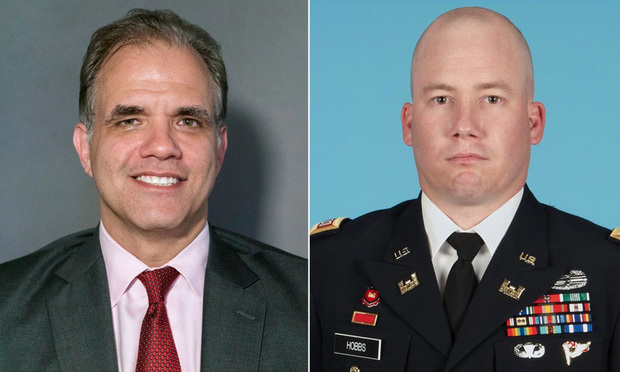Law Grad Who Disclosed Alcoholism as Student Claims Bar Is Now Taking Punitive Action
U.S. Army veteran and law student Julius Hobbs claims the Florida Board of Bar Examiners has breached a settlement agreement by asking him to appear at an investigative hearing, but the board says it is within its rights to do so.
October 09, 2019 at 02:09 PM
5 minute read
 Attorney Matthew Dietz and law student Capt. Julius Hobbs. Courtesy photos.
Attorney Matthew Dietz and law student Capt. Julius Hobbs. Courtesy photos.
 A law student and U.S. Army veteran—who settled a lawsuit alleging the Florida Board of Bar Examiners discriminated against him for having previously sought help for an alcohol disorder—has claimed the board is trying to rehash the issue with an investigative hearing now that he's passed the bar.
A law student and U.S. Army veteran—who settled a lawsuit alleging the Florida Board of Bar Examiners discriminated against him for having previously sought help for an alcohol disorder—has claimed the board is trying to rehash the issue with an investigative hearing now that he's passed the bar.
Julius Hobbs, who sued while he was a second-year student, claimed he faced extra screening from the board because of a prior diagnosis of mild alcohol-use disorder and adjustment disorder. He was arrested for drunken driving in 2006 and 2012 but never convicted. After reaching out to the U.S. Department of Veterans Affairs, Hobbs received five months of psychotherapy.
The case against the examiners settled, and Hobbs passed the bar. But he claimed the board summoned him to an investigative hearing to explain alleged inconsistencies in his deposition testimony. The board noted Hobbs answered "no" to a new question on the application about whether he'd been treated for or had a recurrence of substance abuse, within the past five years, which could impair his ability to practice law.
Hobbs argued he has no issue that could impair his ability to practice and said the board gave up its right to revisit affidavits and depositions when it settled.
"This is a deliberate method for Mr. Hobbs to be forced to further humiliate himself and subject himself to embarrassing inquiry because he enforced his rights," according to the motion by Hobbs' counsel, Miami lawyer Matthew Dietz.
Both sides agreed not to sue over claims arising from or relating to the litigation, "including those of which they do not know or suspect to exist, whether through ignorance, oversight, error, negligence, or otherwise." That encompassed allegations of fraud, deception, concealment, misrepresentation or any other misconduct, according to the agreement. A redacted version of the settlement shows the board also agreed to pay $125,000 in attorney fees and costs to the plaintiff.
But the board of examiners claims it's treating Hobbs as it would any other applicant and argues the agreement doesn't stop it from conducting a background investigation into character, fitness and candor.
"Plaintiff and his counsel are stretching the mutual-release language in the settlement agreement beyond reason, beyond its plain language and meaning, and beyond the parties' agreement," its response said.
The board noted it hadn't asked Hobbs about medication, requested a physical exam, or charged him money. It argued it should be allowed to ask about alcohol use and whether his drinking habits have changed since the summary judgment hearing. At that hearing, U.S. District Judge Robert Hinkle had said of Hobbs, "I don't see any reason to think he can't be a very successful lawyer. But he drinks too much. And if he doesn't think he has a drinking problem, he's kidding himself."
The board's attorney Robert A. McNeely and its general counsel James Almon deferred comment to executive director Michele Gavagni, who labeled the motion as an attempt to relitigate the part of a summary judgment ruling that found the board could investigate alcohol use.
"We are an agency of the Supreme Court of Florida, and the Supreme Court has said candor is the most important aspect in character and fitness," Gavagni said. "We're charged to investigate the character and fitness of each applicant for admission to the Florida Bar."
The board also questioned why Hobbs' 2019 application referenced a 2010 child-custody case he hadn't mentioned in his 2016 application. Hobbs said he'd forgotten to include the case because it was resolved and he'd never missed any child-support payments.
Hobbs' lawyer, Dietz, said the board is welcome to ask about the custody case and his client's current alcohol use but can't revisit litigated issues.
"We're saying he can be asked about that," Dietz said. "We have no question, even if they believe that he still suffers from an alcohol use disorder. Send him to a doctor, get him evaluated. But the purpose of this is to penalize him for standing up to his rights."
Dietz said it's no surprise that there's disagreement over candor, given the parties' history.
"Of course, in any litigation you have adverse parties," Dietz said. "They're not going to agree on everything the other side's going to say, and you're not going to agree that the other side was truthful in what they say. That's why we have trials, and that's why we have facts in dispute."
It's unfair, the way Dietz sees it, to subject Hobbs to further cross-examination in a forum controlled by the defendant. Dietz said his client fears he won't be able to find a job, and has filed a motion for leave to file a reply.
Read more – Minds Over Matters: An Examination of Mental Health in the Legal Profession
This content has been archived. It is available through our partners, LexisNexis® and Bloomberg Law.
To view this content, please continue to their sites.
Not a Lexis Subscriber?
Subscribe Now
Not a Bloomberg Law Subscriber?
Subscribe Now
NOT FOR REPRINT
© 2025 ALM Global, LLC, All Rights Reserved. Request academic re-use from www.copyright.com. All other uses, submit a request to [email protected]. For more information visit Asset & Logo Licensing.
You Might Like
View All
Law Firms Expand Scope of Immigration Expertise Amid Blitz of Trump Orders
6 minute read
Exits Leave American Airlines, SiriusXM, Spotify Searching for New Legal Chiefs
2 minute read
Latest Boutique Combination in Florida Continues Am Law 200 Merger Activity
3 minute read
'Reluctant to Trust'?: NY Courts Continue to Grapple With Complexities of Jury Diversity
Trending Stories
- 1Uber Files RICO Suit Against Plaintiff-Side Firms Alleging Fraudulent Injury Claims
- 2The Law Firm Disrupted: Scrutinizing the Elephant More Than the Mouse
- 3Inherent Diminished Value Damages Unavailable to 3rd-Party Claimants, Court Says
- 4Pa. Defense Firm Sued by Client Over Ex-Eagles Player's $43.5M Med Mal Win
- 5Losses Mount at Morris Manning, but Departing Ex-Chair Stays Bullish About His Old Firm's Future
Who Got The Work
J. Brugh Lower of Gibbons has entered an appearance for industrial equipment supplier Devco Corporation in a pending trademark infringement lawsuit. The suit, accusing the defendant of selling knock-off Graco products, was filed Dec. 18 in New Jersey District Court by Rivkin Radler on behalf of Graco Inc. and Graco Minnesota. The case, assigned to U.S. District Judge Zahid N. Quraishi, is 3:24-cv-11294, Graco Inc. et al v. Devco Corporation.
Who Got The Work
Rebecca Maller-Stein and Kent A. Yalowitz of Arnold & Porter Kaye Scholer have entered their appearances for Hanaco Venture Capital and its executives, Lior Prosor and David Frankel, in a pending securities lawsuit. The action, filed on Dec. 24 in New York Southern District Court by Zell, Aron & Co. on behalf of Goldeneye Advisors, accuses the defendants of negligently and fraudulently managing the plaintiff's $1 million investment. The case, assigned to U.S. District Judge Vernon S. Broderick, is 1:24-cv-09918, Goldeneye Advisors, LLC v. Hanaco Venture Capital, Ltd. et al.
Who Got The Work
Attorneys from A&O Shearman has stepped in as defense counsel for Toronto-Dominion Bank and other defendants in a pending securities class action. The suit, filed Dec. 11 in New York Southern District Court by Bleichmar Fonti & Auld, accuses the defendants of concealing the bank's 'pervasive' deficiencies in regards to its compliance with the Bank Secrecy Act and the quality of its anti-money laundering controls. The case, assigned to U.S. District Judge Arun Subramanian, is 1:24-cv-09445, Gonzalez v. The Toronto-Dominion Bank et al.
Who Got The Work
Crown Castle International, a Pennsylvania company providing shared communications infrastructure, has turned to Luke D. Wolf of Gordon Rees Scully Mansukhani to fend off a pending breach-of-contract lawsuit. The court action, filed Nov. 25 in Michigan Eastern District Court by Hooper Hathaway PC on behalf of The Town Residences LLC, accuses Crown Castle of failing to transfer approximately $30,000 in utility payments from T-Mobile in breach of a roof-top lease and assignment agreement. The case, assigned to U.S. District Judge Susan K. Declercq, is 2:24-cv-13131, The Town Residences LLC v. T-Mobile US, Inc. et al.
Who Got The Work
Wilfred P. Coronato and Daniel M. Schwartz of McCarter & English have stepped in as defense counsel to Electrolux Home Products Inc. in a pending product liability lawsuit. The court action, filed Nov. 26 in New York Eastern District Court by Poulos Lopiccolo PC and Nagel Rice LLP on behalf of David Stern, alleges that the defendant's refrigerators’ drawers and shelving repeatedly break and fall apart within months after purchase. The case, assigned to U.S. District Judge Joan M. Azrack, is 2:24-cv-08204, Stern v. Electrolux Home Products, Inc.
Featured Firms
Law Offices of Gary Martin Hays & Associates, P.C.
(470) 294-1674
Law Offices of Mark E. Salomone
(857) 444-6468
Smith & Hassler
(713) 739-1250








